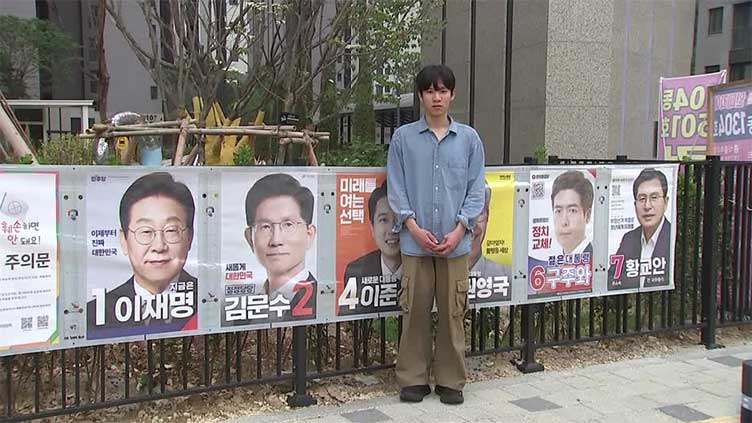Political divide widens along gender lines for first-time South Korean voters

World
Nearly 30% of men aged 18-29 plan to back conservative Reform Party compared with 3% young women
CHEONAN (Reuters) – South Korea's young women are expected to lead a broad political backlash against the main conservative party at the presidential elections on June 3, punishing it for months of chaos.
Multitudes of young men, though, are unlikely to join them.
First-time South Korean voter Lee Jeong-min is one of them.
He says he will vote for the conservative Reform Party's candidate, Lee Jun-seok, on June 3. Lee, the candidate, vows to shut down the Ministry of Gender Equality and Family, emphasising an issue that resonates with men like 20-year-old Lee Jeong-min, who particularly resents that only men, not women, must undergo military service.
“What makes me angry about the society is the fact that only men are required to serve in the military... young men, unlike their female peers, are unable to fully engage in various activities in society because they have to serve 18 months in the military,” said Lee.
In South Korea, nearly 30 percent of men aged 18-29 plan to back Lee's conservative Reform Party compared with just 3% of young women, according to a Gallup Korea poll in May.
Another 29% of the men support the other conservative People Power Party despite the chaotic reign of its standard-bearer, Yoon Suk Yeol, who was impeached after a botched attempt to impose martial law in December.
In total, more than half of the men back right-wing parties while almost half the women want the left-wing Democratic Party candidate to win. This divergence narrows for older age groups.
In addition to Yoon's botched martial law and political chaos marking the final months of his tenure, women voters also felt alienated by policies and rhetoric aimed at attracting young male voters. For instance, his administration had also pledged to abolish the Ministry of Gender Equality and Family. When the plan faced obstacles, the administration left the ministerial post vacant, and it has remained unfilled since February 21, 2024, when Minister Kim Hyun-sook's resignation was accepted.
As one of the young women who took part in the anti-Yoon protests, 18-year-old first-time voter Kwon See-hyun said she plans to support a candidate who offers strong policies on women’s rights.
“It's true that the gender gap is particularly severe in South Korea. There are times when it feels hopeless, as if we've crossed a river of no return. Nevertheless, I believe we must continue to strive for change because, when I went to the (anti-Yoon) protests, there were young men in their 20s present too. So we can't say they weren't part of the movement," said Kwon.
Even as young voters remain deeply divided, many are distancing themselves from the older generation's ideological polarisation. Their focus has shifted toward social and gender issues, rather than the more entrenched ideological and generational fault lines that defined past elections.
Political economist Soohyun Lee, of King's College London, said young South Korean men are turning towards conservative candidates because they feel unable to meet traditional expectations, such as finding a stable job, starting a family, or buying a house.
She warned the gender divide could also make other challenges, such as reform of tax and welfare policies, more difficult to achieve.
"If the future generation is ever so divided along the lines of gender and then refuses to engage with each other to build social consensus, I do not think we can successfully tackle these huge issues," she said.
Despite assertions from some conservatives that South Korea's job market increasingly favours women, data has shown that the country has one of the largest gender pay gaps and lowest female employment rates in the Organisation for Economic Co-operation and Development (OECD).


